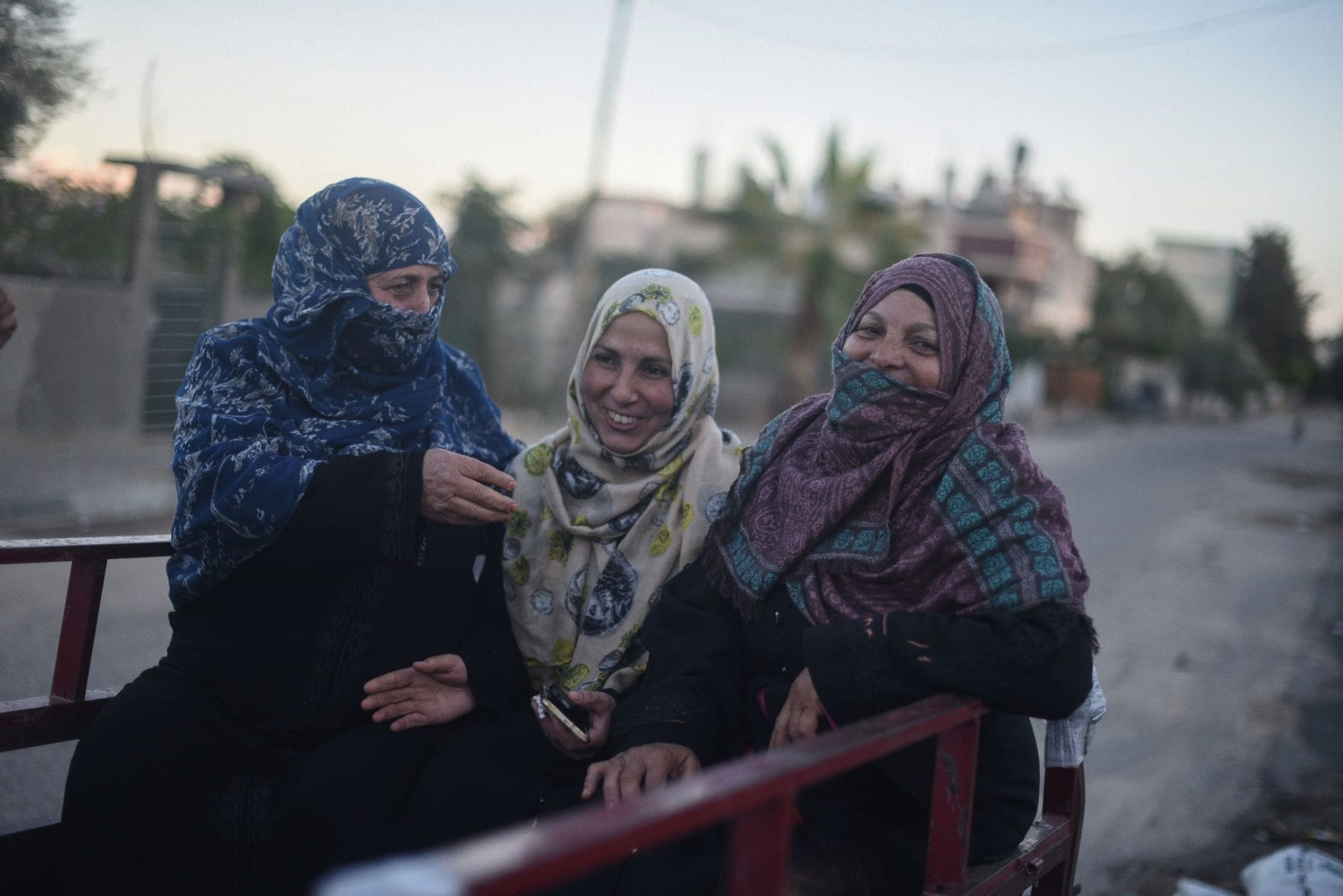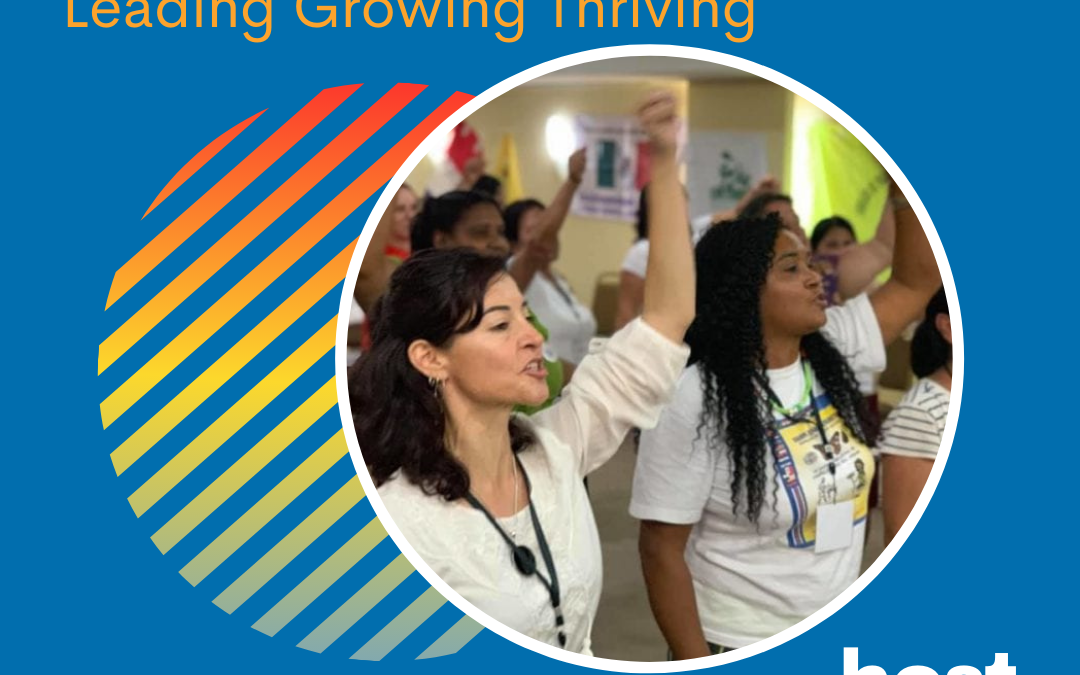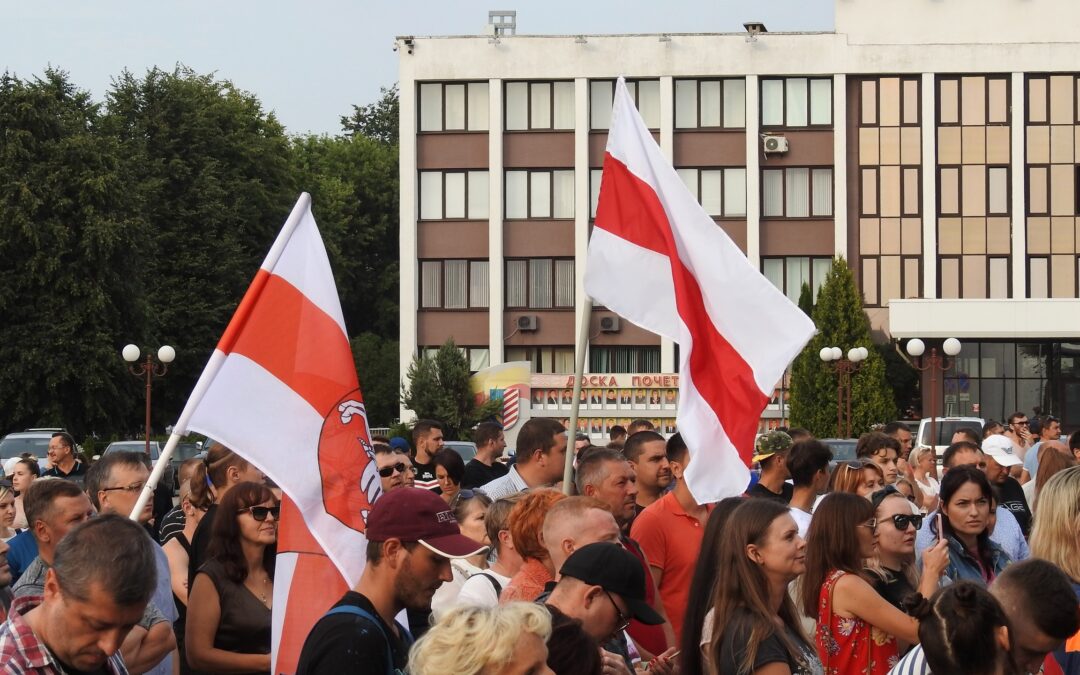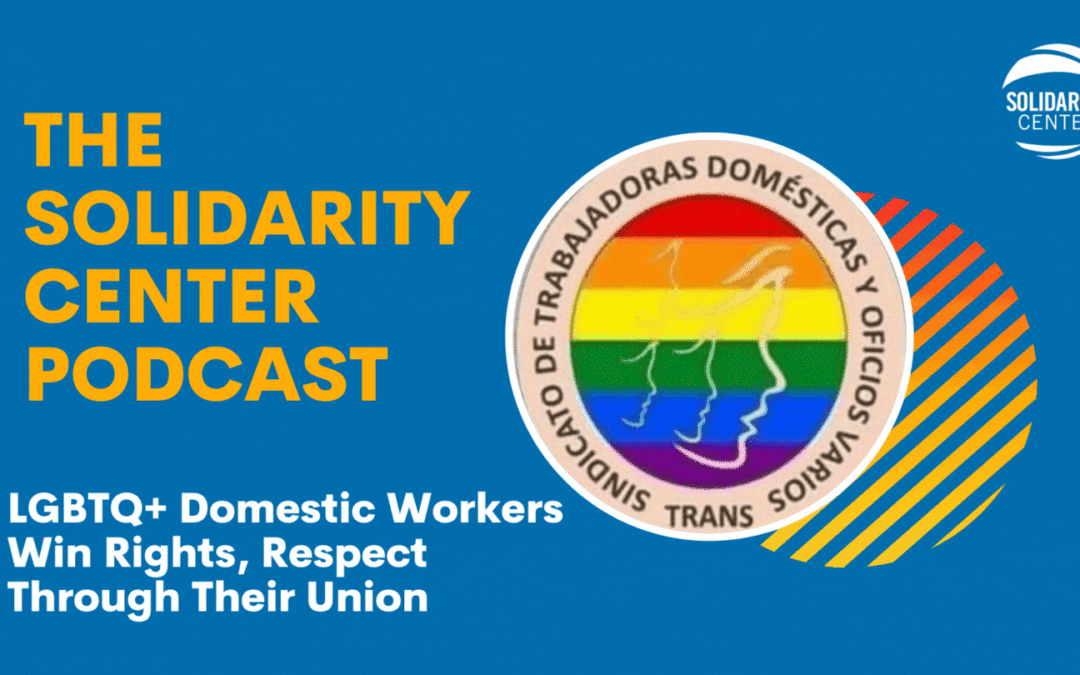
Apr 21, 2021
When the Nigerian government sought to raise taxes on basic goods and decrease subsidies on key items like fuel as millions of workers struggled without jobs or wages during the COVID-19 pandemic, the 4 million members of the Nigerian Labor Congress (NLC) successfully stood up against these assaults. NLC President Ayuba Wabba says the union first tried negotiating with the government. When that effort did not work, workers were set to strike, he said on the latest episode of The Solidarity Center Podcast.
“Many Nigerians are in very difficult situations right now because of the challenge of COVID-19. Most of their income have been disrupted and their survival is so difficult. So that is why we have to respond, to actually draw the attention of government. And such an approach is very, very necessary. We thought that governance should be about the interest of justice,” Wabba told podcast host and Solidarity Center Executive Director Shawna Bader-Blau.
A New Social Contract
In a wide-ranging conversation, Wabba, who is president of the International Trade Union Confederation (ITUC), describes efforts at the global level to build a post-COVID world where all workers are covered by social protections such as paid sick leave, access to protective safety equipment, health care and good wages.
“COVID-19 has exposed the inadequacies in the entire social protection system,” he says. “We are also trying to make sure that COVID-19 is one of the diseases that is also covered by occupational health and safety for all workers, including casual workers, including migrant workers, including workers working in the precarious sector because this is very important. If not, the inequality gap between the rich and the poor will continue to be widened.”
As a global union leader, Wabba is at the forefront of the international campaign to ensure the future of work ensures good jobs as well as green jobs to address the ongoing challenges of climate change. “You don’t need to contaminate the environment for you to be able to retain jobs. Jobs can be produced using greener forms of energy.”
Download Season One Episodes
The Solidarity Center Podcast, “Billions of Us, One Just Future,” highlights conversations with workers (and other smart people) worldwide shaping the workplace for the better.
Check out the full first season of The Solidarity Center Podcast and stay tuned for season two this fall!
This podcast was made possible by the generous support of the American people through the U.S. Agency for International Development (USAID) under Cooperative Agreement No.AID-OAA-L-16-00001 and the opinions expressed herein are those of the participant(s) and do not necessarily reflect the views of USAID/USG.

Apr 20, 2021
Workers in Palestine now have even more support for their efforts to achieve rights and respect at work: The National Alliance for Social Justice in Palestine, launched in Ramallah in recent days, seeks to craft Palestinian labor law in line with international labor standards and expand equitable legislation for all Palestinians. Alliance leaders say such coordination is especially essential to advance social justice standards and worker protection during COVID-19 lockdowns.
The 41-member alliance, headed by the Palestinian General Federation of Trade Unions (PGFTU), includes the majority of professional unions, trade unions and Palestinian civil society institutions in the West Bank and Gaza. PGFTU spearheaded the coalition with support of the International Labor Organization (ILO) in March 2021.
Among the Code of Honor Principles:
- Adopting the principles and standards of sustainable and alternative development to build a national economy and reject all forms of normalization
- Adopting a participatory, holistic approach in implementing the Alliance’s plan and programs
- Promoting and adopting mechanisms to advocate and campaign for policies and regulations on economic and social rights and amendments to the labor law in line with international labor standards
- Believing in the coalition that will build labor law, policies and social protection systems
- Believing in the necessity of unifying demands on issues of social justice, economic and social rights, and trade union demands for all member institutions of the coalition
Among the Alliance Founding Partners:
- PGFTU (president)
- General Union of Palestinian Workers
- The General Federation of Independent Trade Unions
- The General Union of Palestinian Women in West bank and Gaza Strip
- Sharek Youth Forum
- Wasel Foundation for Youth Development
- Women and Media Development Association – TAM
- Center of Psychosocial Counselling for Women
- The Palestinian Foundation for Empowerment and Local Development – Reform
- Center for Feminist Studies
- Palestinian Broadcasting Union
- Palestinian NGOs Network
- Union of Palestinian University Professors and Employees
Solidarity Center programs in Palestine support the PGFTU in building coalitions with civil society organizations to combine efforts with the labor movement to advocate for national policy reform, campaign for labor rights and address the important issues for workers collectively.

Apr 14, 2021
Domestic workers are among the most invisible workers in the world—yet in Latin America, they are joining together to champion their rights at their workplace and in their communities, says Adriana Paz Ramirez on this week’s episode of The Solidarity Center Podcast.
Paz, Latin American regional coordinator for the International Domestic Workers Federation (IDWF), says these mostly Black and Indigenous women are breaking decades of intergenerational oppression and trauma, and forging new paths through holistic leadership training, creating community-wide social movements and expanding their strength by connecting with each other.
Within six months of a recent leadership training, for example, 9,000 new members signed up with 26 organizations, Paz tells host Shawna Bader-Blau, Solidarity Center executive director.
“I was so touched by a domestic worker leader who said that I have not been able to give my daughter an inheritance, like money or a house, but I’m giving her this movement. Because this is changing our lives, because this is changing our countries, because this is changing history,” she says.
“That is the significance of getting themselves into a union. If the women at the bottom of the bottom are racing up, all of us are raising up.”
Listen Anytime to The Solidarity Center Podcast
The Solidarity Center Podcast, “Billions of Us, One Just Future,” highlights conversations with workers (and other smart people) worldwide shaping the workplace for the better.
Be sure to catch last week’s episode in which Bader-Blau talks with Francia Blanco, a trans rights activist, domestic worker and union leader in Nicaragua who is working with her union to achieve rights, respect and dignity on the job for all LGBTQ+ workers.
Look for final episode this season on April 21, with International Trade Union Confederation President Ayuba Wabba. He explores the Nigerian labor movement’s response to the COVID-19 crisis and discusses the global labor movement’s plans to build back better for workers around the world
And check out recent episodes:
• LGBTQ+ Domestic Workers Win Rights with Their Union
• Making the Gig Economy Work for Workers
• Winning Rights for Migrant Workers
• Defending Democracy: Workers on the Frontline
• Ending Gender-Based Violence at Work: The Campaign to Ratify ILO C190
This podcast was made possible by the generous support of the American people through the U.S. Agency for International Development (USAID) under Cooperative Agreement No.AID-OAA-L-16-00001 and the opinions expressed herein are those of the participant(s) and do not necessarily reflect the views of USAID/USG.

Apr 13, 2021
Three union leaders and a worker rights activist were arrested in Belarus, and the government is proposing a new law tightening restrictions on public gatherings as it ramps up repression against unions and their members who are demanding free and fair elections and democratic freedoms like the right to form unions.
Anna Kalupakho, Sergei Lapunov and Andrei Schkirenko of the Belarusian Independent Trade Union (BDP) were arrested in recent days, along with Aleksandr Kashpul, an activist at JSC “Naftan,” an oil refinery and petrochemical complex where workers went on strike.
They say they were given no reason for their arrest.
Four striking Naftan workers also are on trial, along with Kalupakho, a strike committee member at the Belarus metallurgical plant in Zhlobino, union leaders say. (Support Naftan workers here.)
Police also came to the local union’s office at Naftan, questioning staff about official permits for the union premises. Since then, several police members have patrolled the building, according to union leaders.
“At the moment, we are experiencing an escalation of tensions on the part of the Belarusian government,” says a leader of the independent union movement. “A sharp turn for the worst has occurred at JSC Naftan. The enterprise administration uses the police and the prosecutor’s office to pressure the striking workers and force them to quit,” he says.
Government Seeking to Further Restrict Freedom to Gather
The government is now seeking to amend the country’s public demonstration law to legally permit employers to fire, without prior union consent, anyone arrested for participating in a protest event. Proposed amendments also would allow unions to be punished if any of their members participate in a public demonstration that has not received prior approval from government authorities.
“The above changes in the legislation heavily aggravate the already depressing situation with workers and trade unions rights in Belarus,” writes Aliaksandr Yarashuk, BKDP president, in a letter to the International Labor Organization (ILO), which is part of the United Nations. “They allow the government to violate grossly and shamelessly the norms of the fundamental ILO Conventions.”
(Siarhei Antusevich, BKDP vice president, describes workers’ ongoing struggle for democracy in conversation with Solidarity Center Executive Director Shawna Bader-Blau at The Solidarity Center Podcast. Listen here.)
Belarus Independent Unions Win International Prize
The Belarusian Congress of Democratic Trade Unions (BDKP) and its three affiliates, BDP, the Free Metal Workers’ Union (SPM) and Belarusian Radio and Electronic Industry Workers’ Union (REP) last week were awarded the 2021 Arthur Svensson international prize for trade union rights for their fearless struggle for democracy and union rights.
“The independent trade union movement has been central in the fight against the falsification of election result and the fight for democracy,” says Frode Alfheim, president of the Norwegian Industri Energi union, which established the prize to promote and strengthen trade unions and trade union rights internationally.
Workers at factories across Belarus have been fired and sometimes arrested for taking part in pro-democracy rallies. For instance, at the Belarus Metallurgical Plant (BMZ), where workers went on strike in August, four workers were sentenced to more than two years in prison for the “organization of actions in gross violation of public order” in February, and the conviction was upheld in March. Many other strike participants and strike committee activists have been fired and the state-controlled courts have refused to reinstate them, according to union leaders. (Support BMZ workers here.)
Workers at other plants, who took part in an October national day of action in support of The People’s Ultimatum, have been fired and some imprisoned, including workers at the Grodno Azot plant. Thirteen fired employees at Grodno Azot plant have submitted a collective appeal, demanding reinstatement and calling out their dismissal as unjustified. (Support the Grodno Azot workers here.)
Global Condemnation for Attacks on Workers
The ILO issued a report in late March reinforcing documentation by the International Trade Union Confederation (ITUC) on widespread arrests, prosecution and firing of workers engaged in strikes and pro-democracy rallies in Belarus, and government repression of basic civic freedoms, such as forming unions, bargaining collectively and striking.
Among other recommendations, the ILO “urges the government to investigate without delay the alleged instances of intimidation or physical violence through an independent judicial inquiry, in order to shed light on the facts and circumstances surrounding these acts, and to identify those responsible, punish the guilty parties and thus prevent the repetition of similar event.”
In August 2020, hundreds of thousands of people, often led by union members, many of them women, took to the streets to protest elections in which President Alexander Lukashenko declared himself winner in a landslide victory amid widespread allegations of fraud. Popular opposition candidate, Sviatlana Tsikhanouskaya, was forced into exile, and the government has since arrested at least 30,000 thousand protestors, often torturing them in prison, and an unknown number have been killed.

Apr 7, 2021
As a trans domestic worker from Nicaragua working in Guatemala, Francia Blanco says her experiences with verbal and physical abuse, discrimination, and forced labor conditions led her to take action to build a world where trans domestic workers had rights, respect and dignity on the job. And, back in Nicaragua, that’s exactly what she and her co-workers are doing through SITRADOVTRANS, a union of trans domestic workers that is breaking barriers in the labor movement and beyond.
“We all know that at times, results can be slow to appear but we always are training up more of our members to not only learn more themselves but also find more women in the community who want to be part of this process,” she says.
“And it’s an ongoing process because you know we live in a globalized world and things are always changing so this is not something that can stop, we always have to be moving with it.”
Blanco spoke with Solidarity Center Executive Director Shawna Bader-Blau in this week’s episode of The Solidarity Center Podcast.
Blanco’s union is a member of FETRADOMOV, the federation of domestic workers in Nicaragua.
“For us as a trans union, it is very important to affiliate with unions on the national level. We have more support when we are in greater numbers. And also, we are domestic workers. Most trans women see domestic work as one of the few options they have access to.”
Listen Anytime to The Solidarity Center Podcast!
The Solidarity Center Podcast, “Billions of Us, One Just Future,” highlights conversations with workers (and other smart people) worldwide shaping the workplace for the better.
Look for upcoming episodes, including:
April 14: Adriana Paz, an advocate with the International Domestic Workers Federation who understands firsthand the power of unions in ensuring domestic workers have safe, decent jobs
April 21: International Trade Union Confederation President Ayuba Wabba, who explores the Nigerian labor movement’s response to the COVID crisis on workers and discusses the global labor movement’s plans to build back better for workers around the world
And check out recent episodes:
- Winning Rights for Migrant Workers
- Defending Democracy: Workers on the Frontline
- Ending Gender-Based Violence at Work: The Campaign to Ratify ILO C190
This podcast was made possible by the generous support of the American people through the U.S. Agency for International Development (USAID) under Cooperative Agreement No.AID-OAA-L-16-00001 and the opinions expressed herein are those of the participant(s) and do not necessarily reflect the views of USAID/USG.





